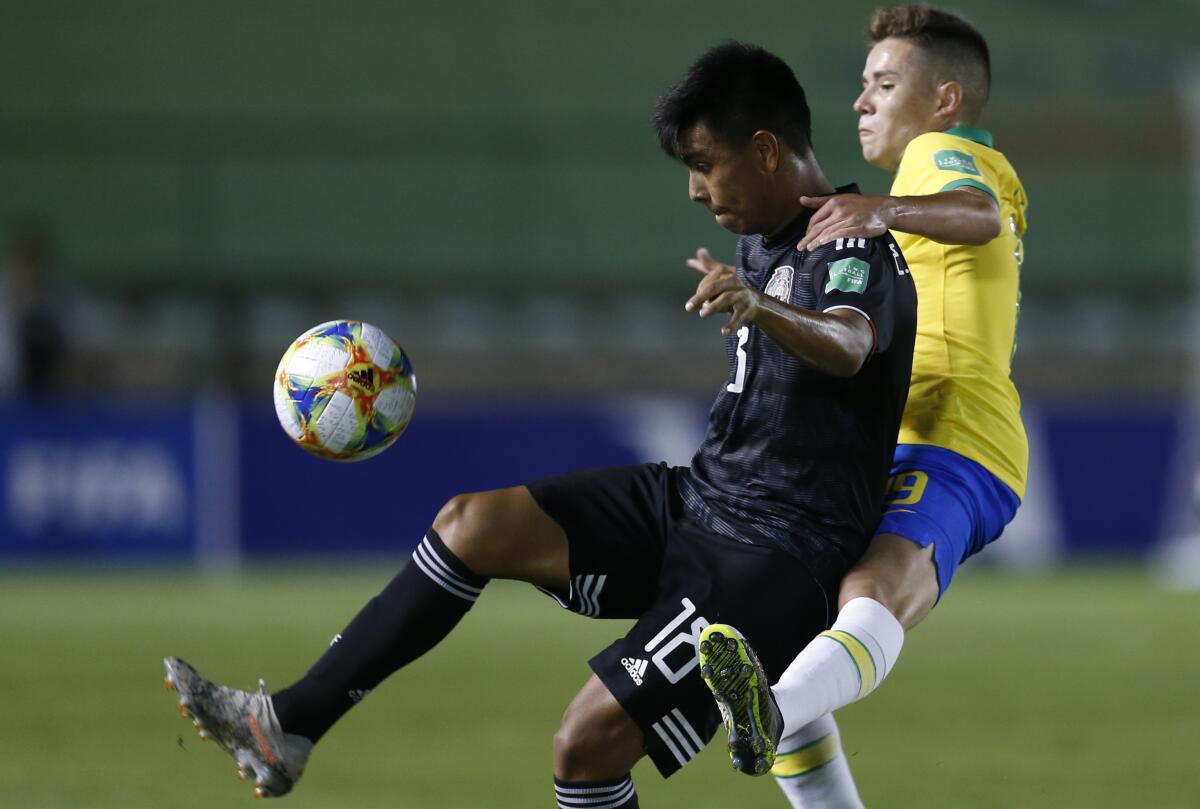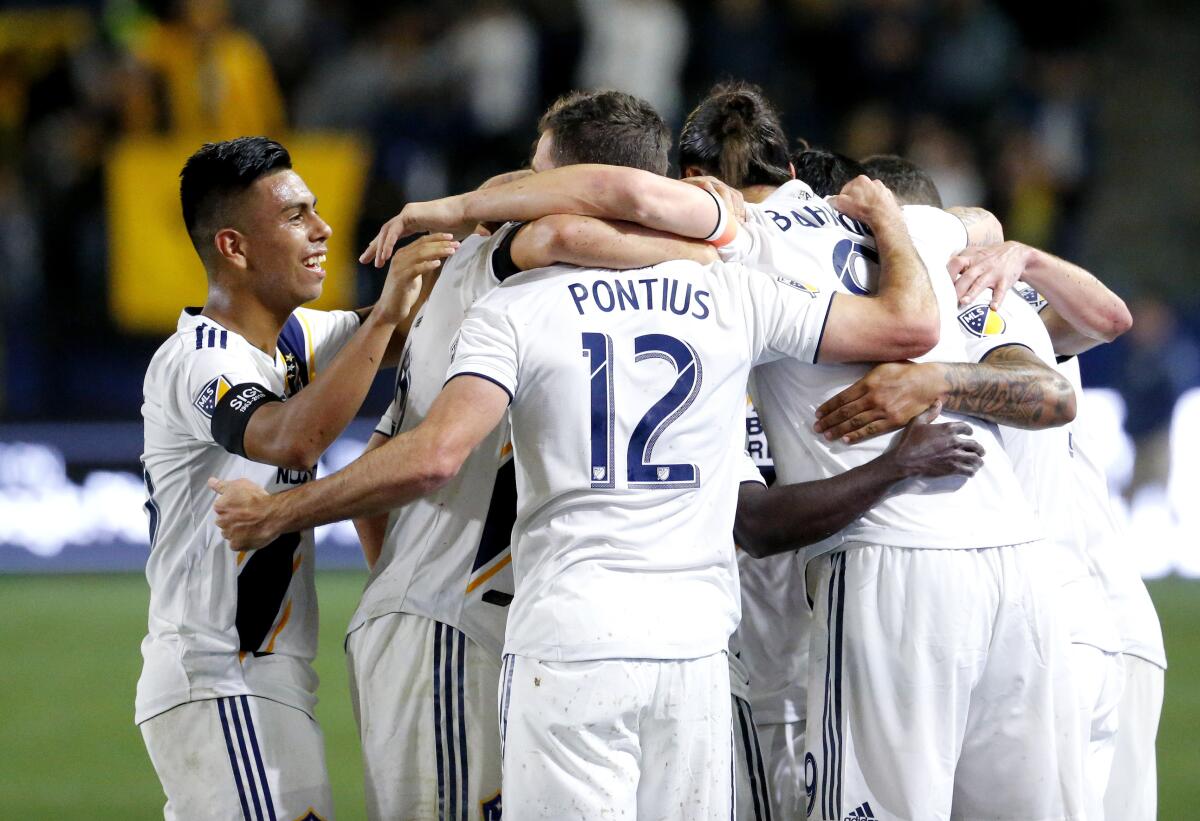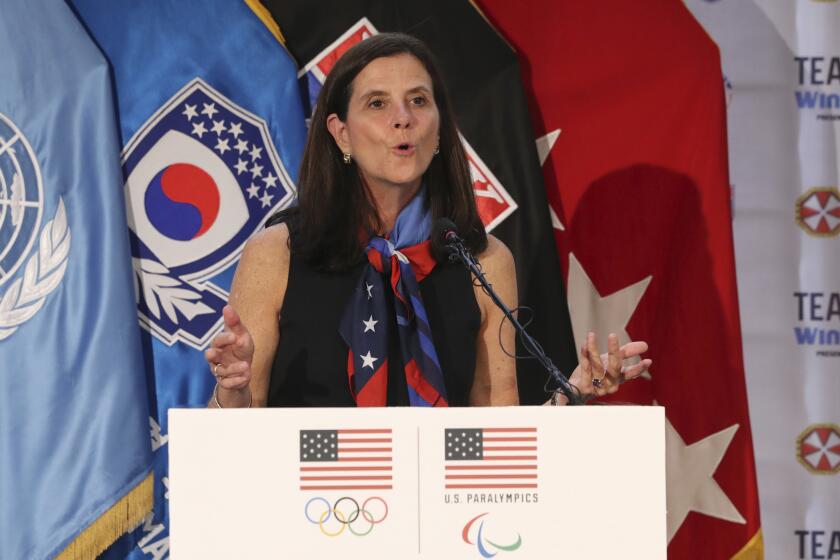Column: Galaxy prodigy Efraín Álvarez returns from shutdown a new man. ‘Quarantine helped me’
- Share via
He’s special. Throughout his childhood in East Los Angeles, that was obvious to everyone, from his Mexican immigrant parents laboring at a meatpacking plant to the former players guiding his soccer career.
Efraín Álvarez started playing for youth national teams at 12 and signed his first professional contract at 15. Last year, at 16, he made his Major League Soccer debut as a late-game substitute and created two goals in a season-opening comeback victory for his hometown team, the Galaxy.
“He’s the best talent in MLS by far,” declared Zlatan Ibrahimovic, the world-class striker who was a teammate at the time.
Yet now, a week after his 18th birthday, Álvarez is already at a crossroads, with observers wondering if he will climb to be the next Christian Pulisic or slide like Freddy Adu.
Pulisic, 21, successfully transitioned from child prodigy to international star, the established leader of the U.S. national team’s attack who commanded a $73 million transfer fee when he was sold by the German club team Borussia Dortmund to Chelsea of England. Adu was compared to Pele when he broke into MLS at 14, only to become a journeyman. At 31, Adu is out of the game.
If Álvarez played baseball or basketball, this wouldn’t potentially be a make-or-break year from him. But soccer demands more sooner, at least from players with Álvarez’s upside. Even top teams routinely give opportunities to teenagers. This week, a 15-year-old nicknamed the “Mexican Messi” appeared in Spain’s first division. His teammates included a 19-year-old from Japan already four years into his own career.
The NWSL came up with a plan to become the first U.S. soccer league to return, and that landed the women’s league a spot on national TV Saturday.
As well as Álvarez played in the opener for the Galaxy and at the Under-17 World Cup for Mexico, he spent the majority of his rookie MLS season in the background, starting only four games. His distinct qualities — the precision of his left foot, his sense of anticipation and timing — didn’t entirely make up for the reality that he was a boy playing against men.
He wasn’t taking care of his body, leading to concerns about how his stocky 5-foot-8 frame might look in the future. His defense bordered on nonexistent. He retained the mindset of youth player who was always a couple of steps ahead of opponents because of his advanced technique and know-how.
“I was thinking, ‘With my attacking [talent], I can do anything I want,” Álvarez said.
Ibrahimovic convinced him change was necessary. As the greatest scorer of his generation outside of Lionel Messi and Cristiano Ronaldo, the outspoken Swede’s words carried weight. Before he joined the Galaxy, Ibrahimovic played for many of the world’s most prestigious teams, including Juventus, Inter Milan, Barcelona, AC Milan, Paris Saint-Germain and Manchester United.
“Efra, if you ever want to play in Europe, you have to be at your max every day,” Álvarez said he was told by Ibrahimovic. “It’s a live-or-die situation.”
Álvarez recalled Ibrahimovic’s advice when the MLS season was suspended in March because of the coronavirus outbreak.
“It was time for me to change,” he said.

Álvarez consulted his 29-year-old brother, Carlos, who plays for the San Diego Loyal of the United Soccer League, a second-tier pro league.
Carlos emphasized eating healthier and in smaller portions. He encouraged replacing sports drinks and potato chips with water and fruits. He provided nutritional supplements from a company that sponsors him and his wife, Renae Cuellar, who represented Mexico at the 2015 Women’s World Cup.
Cuellar’s father runs a soccer training facility in the City of Industry and helped Efraín develop a workout program that included resistance bands and dumbbells.
Carlos also preached the importance of defense. “In the game right now, as an offensive player, you have to defend,” Carlos said. “There’s no such thing any more as the luxury No. 10 or the forward who doesn’t run. Now, everybody runs.”
Messi, who is the best player in the world, defends. So does Javier “Chicharito” Hernandez, the all-time leading scorer of the Mexican national team who plays for the Galaxy.
Carlos believes his own shortcomings on defense are why he lasted only three years in MLS. He was once a highly regarded prospect himself, selected by now-defunct Chivas USA with the No. 2 overall pick in the 2013 draft.
“I went through stuff that I don’t want him to go through,” Carlos said.
Gordon Wild grew up in a family of circus performers. But he eventually found soccer to be his calling and that has led him to a spot with the Galaxy.
Conventional wisdom would hold that MLS’ shutdown deprived Álvarez of four critical months of development. The league, which started in February, won’t restart play until next month.
But Álvarez didn’t see the downtime as a waste.
“The quarantine helped me,” he said.
When the Galaxy reopened their facility for individual workouts last month, management was pleasantly surprised by the degree to which their academy graduate had reduced his body fat while gaining muscle.
“I think it speaks very well of him,” said general manager Dennis te Kloese, who also worked with Álvarez in the Mexican Football Federation.
Álvarez noticed improvements when the Galaxy resumed full-squad workouts this month.
“I can move more,” he said. “When you cut sharp. All the little stuff.”
And when he defends, he closes down on his opponents quicker.
June 17 marks the two-year anniversary of Mexico stunning Germany in the 2018 FIFA World Cup. For many fans, this is the most significant victory for El Tri.
Te Kloese wants Álvarez to model himself after Galaxy winger Cristian Pavon, a member of Argentina’s 2018 World Cup team who combines creativity with a steady work rate. If Alvarez defends with more enthusiasm and attacks with greater efficiency, Te Kloese said he should receive more playing time.
Alvarez is expected to have chances at the MLS is Back Tournament in Orlando, in which the league’s 26 teams are scheduled to compete in a World Cup-style event. The Galaxy are expected to play three games in 11 days starting July 13, and Álvarez figures to see plenty of action as his veteran teammates work their way into shape.
“I think this is the year I do something big for myself and for my family,” Álvarez said.
Performing well for the Galaxy could result in an important opportunity in Europe.
“But of course, if I have the chance, I’d love to go play there,” Álvarez said. “It’s every soccer player’s dream.”
While MLS has improved in recent years, Europe’s top leagues remain the standard. The players are better and the salaries higher. Álvarez would prefer to make such a move sooner than later.
“If I ever want Europe, it’s time now,” he said. “… I want to go as soon as possible to adapt there as well.”

During international competitions, Alvarez intends to continue representing Mexico. A dual citizen, the bilingual Alvarez played for the United States, his birth country, at the under-15 level. He switched to his parents’ homeland in 2016. Alvarez remains eligible to play for both countries because he hasn’t appeared in an official competition at the senior level.
“I have my doors open, but right now I’m happy with Mexico,” Alvarez said. “If everything goes as planned, I would love to stay in Mexico.”
As the former director of Mexico’s youth national teams, Te Kloese has closely observed a number of child prodigies. Some became stars. Many disappeared. Asked what separates the player who makes it from the one who doesn’t, Te Kloese replied, “I think it’s basically mentality and character.”
Te Kloese added that environment is crucial. The people overseeing the development of a player have to manage his ego while maintaining his confidence and exercise patience as he learns the parts of the game his talented permitted him to ignore as a youth player.
“These kids, with their special talent, they need some special management,” Te Kloese said. “I think it’s worth paying a lot of attention to these kids because they’re different. They can make a difference for a team or a federation or a club team. You need to be careful with them because you can’t just grab them from a tree. In our specific case of Efra, I think he’s really worth the investment because he’s very talented.”
Te Kloese would like to think the Galaxy are providing Alvarez with the proper support. As for the necessary mentality and character, he’s hopeful Alvarez has discovered them.
More to Read
Go beyond the scoreboard
Get the latest on L.A.'s teams in the daily Sports Report newsletter.
You may occasionally receive promotional content from the Los Angeles Times.












